Tl;DR
Despite all the talks about matching content with users’ search intent, keyword research continues as the foundation of every successful SEO strategy, even today.
The best words or phrases (keywords) can either make or break your online presence and mentions in ChatGPT/AI Overviews’ answer briefs. Identifying the right keywords is a surefire competitive win. Today’s marketers like you are blessed with powerful options, such as Google Keyword Planner, free keyword research tools, and generative AI engines, where researching keywords is quick, effective, and free.
Let’s talk about the best SEO keyword research tools you have at your disposal.
Understanding the Benefits of Keyword Research for AI SEO
Before identifying the best keyword research tools to identify the exact words users pick to research services/products similar to yours, let’s discuss the benefits of comprehensive keyword research.
Today, keyword research has gone beyond the archaic method of finding words/phrases related to your product/service and understanding their search volumes and competition. The study extends to divulging the competition gap and detecting the end-user’s true intent so you can generate relevant content to enhance your website’s chances of being more visible on AI search.
Here are the benefits mentioned in brief:
- Reveals User Search Behaviour: Keyword research demonstrates what users search for.
- Speaks Your Audience’s Language: Such keywords help you to articulate the language of queries your target audience uses.
- Targets Natural Phrases: Long-tail and conversational keywords are more specific and unique to how people naturally speak and search.
- Enhances Context Understanding: These phrases will help AI to understand the context of user queries better.
- Enriches Content: Semantic keywords, aka related words or synonyms, add depth to your content and align it with users’ search intent.
- Optimises for AI Search: Aligning content with how AI prefers through relevant search terms improves visibility and garners attention from AI-driven search engines.
- Boosts AI SEO-Optimised Visibility: An AI SEO-optimised content will have a better placement opportunity in AI-powered search results and summaries.
- Drives Traffic: Matching your content with user intent helps AI to easily discover you and drive more organic traffic to your website.
How to do Keyword Research for Traditional vs. AI SEO

Undoubtedly, both methods are strikingly different, from their approach and goal standpoint, but can (or should) be used together to get a better outcome. Consider them as two unique pieces of a puzzle.
That said, knowing the differences between them is crucial.
Here’s how traditional keyword search is different from the present model:
| Attributes | Traditional Keyword Research (SEO) | Generative Keyword Research (AI SEO) |
| Primary Goal | Rank high in the list of blue links. | Be featured or cited in the AI-generated answer (e.g., Google’s AI Overviews). |
| Keyword Focus | Short and medium-tail keywords (e.g., “best running shoes”). | Full questions and conversational, long-tail queries (e.g., “what are the best running shoes for flat feet and road running?”). |
| User Intent | Broader intent (Informational, Commercial, Navigational). | Hyper-specific, “point-of-need” intent. The user wants a direct, consolidated answer now. |
| Content Strategy | Build a comprehensive page about a topic. | Provide clear, concise, and direct answers to specific questions within a comprehensive page. |
| Key Tools | Ahrefs, Semrush, Google Keyword Planner (for volume & difficulty data). | ChatGPT, Google’s “People Also Ask,” AnswerThePublic, and Reddit (for conversational queries). |
| Metric of Success | Ranking position, organic traffic, and impressions. | Appearance in AI Overviews, citations, and direct answer traffic. |
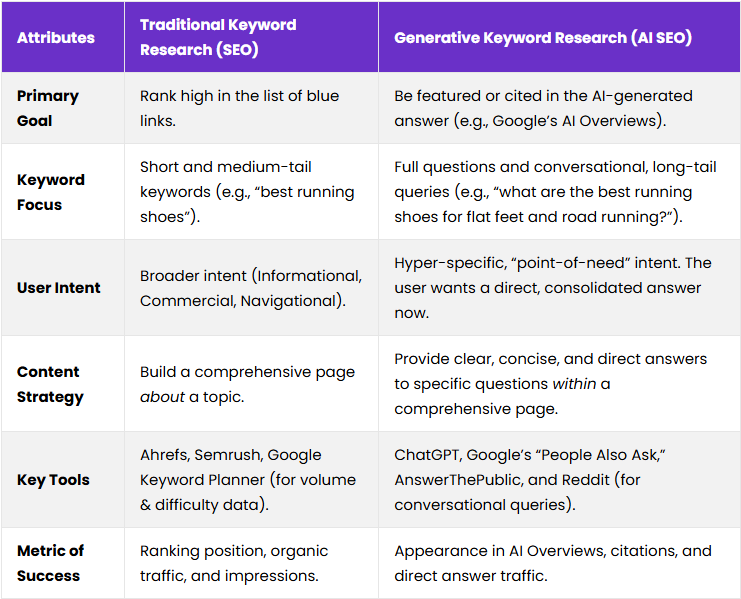
Once you understand each of the method’s key attributes, following their approach becomes easy. A brief overview of each technique is shared below:
Five Steps to Master Keyword Research for Traditional SEO
When you talk about the traditional method, you mean using a regular, free keyword research tool, where the outcome is more data-rich, governed by one singular objective – generating higher rankings for your website in the standard search results. Anyone who is into search engine optimisation will know the basic steps, which are:
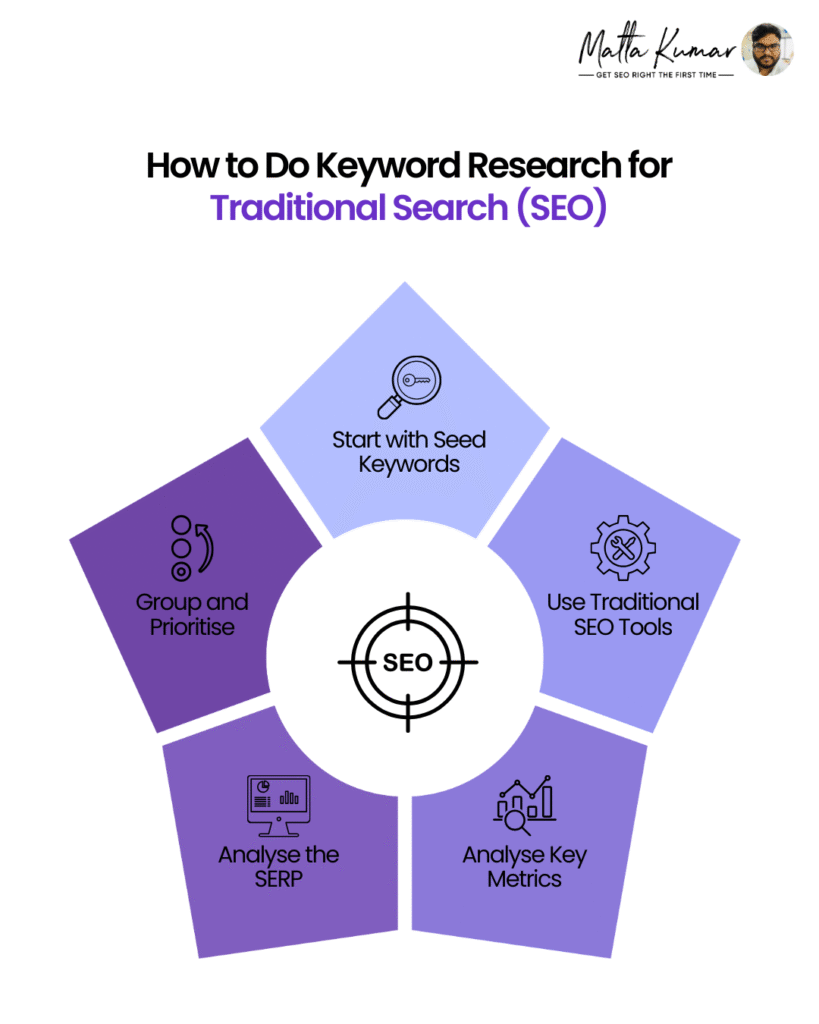
1. Start with Seed Keywords
Begin with broad topics relevant to your business. These are your “seed” keywords.
- Example: If you sell cameras, your seeds are “digital camera,” “camera lens,” “travel photography.”
2. Use Traditional SEO Tools
Input your seed keywords into tools like Ahrefs, Semrush, or Google Keyword Planner. These tools will generate thousands of related keyword ideas and provide crucial data.
3. Analyse Key Metrics
Focus on three primary metrics to find the best opportunities:
- Search Volume (total users searching for this keyword/month).
- Keyword Difficulty (more competition).
- Cost Per Click (CPC) (keywords’ bidding price).
Key Takeaways:
- The higher the search volume, the better
- The lower the keyword difficulty, the easier it is to rank
- The higher the CPC, the stronger the intent
4. Analyse the SERP
For any promising keyword, perform a Google search. Look at what’s already ranking on the first page. Identify:
- The kind of content is ranking (blog posts, product pages, videos)
- The search intent of users
- Your competitors’ missed opportunities
Key Takeaway: Paid keyword research tools that allow gap analysis are the ones you should consider here.
5. Group and Priorities
Group related keywords into “clusters.” You can do this by targeting a broad, high-volume keyword and creating a primary “pillar page” around it, while using more specific, related words and phrases to support articles that link back to the pillar page.
Five Steps to Master Keyword Research for AI SEO
This approach is more qualitative and focuses on anticipating the exact questions users will ask AI.

1. Start with a User Problem
Instead of a keyword, start with a core problem or topic your audience faces.
- Example: “A beginner trying to choose their first camera for a vacation.”
2. Brainstorm with Conversational Tools
This is where AI chatbots and question-based tools excel.
- ChatGPT/Gemini: Use prompts to simulate user questions.
- Prompt: “Act as a beginner photographer. What are all the questions you would ask when trying to buy your first camera for travel?”
- AnswerThePublic: Enter your topic (e.g., “travel camera”) to get visualisations of hundreds of questions people ask.
- Reddit & Quora: Search these forums for your topic. You’ll find real people asking questions in their natural language. Note the phrasing and the follow-up questions.
3. Identify Full Questions and Conversational Queries
Your goal is to collect a list of complete, conversational questions. These are your new “keywords.”
- “What’s the difference between mirrorless and DSLR for a beginner?”
- “Is a fixed lens or an interchangeable lens better for travel photography?”
- “How much should I spend on my first travel camera?”
4. Structure Content for Direct Answers
Your keyword research should directly inform your content structure. Create sections in your articles that provide clear, concise answers to these questions. Use the questions themselves as H2 or H3 subheadings and follow them with a direct answer in the first paragraph. FAQ sections are perfect for AI SEO.
5. Verify with Traditional Tools
Once you have your list of questions, run them through a traditional SEO keyword tool to check for search volume. This helps your priorities which questions to answer first. Often, you’ll find that these long-tail questions have low individual volume, but collectively they can bring in significant traffic and establish your authority.
Key Takeaway: The modern keyword research begins with conversational engines and then follows the traditional path to generate the most relevant keywords for your website.
Best Practices (If Any) for the Modern Approach to Keyword Research
Every approach has a winning formula, which sets apart a well-optimised, highly-visible, and prominent brand from the less fortunate ones. This means that these companies not only have access to the best keyword research tools in the market but also know how to utilise them smartly. It’s not rocket science, though; rather, a careful and well-chalked-out plan to get the best outcome possible.
Here are some of the best practices to remember:
- Understand the user’s intent behind each search term.
- Find keywords specific to different stages (awareness, consideration, decision).
- Consider users’ pain points and questions (at each stage).
- Identify broad concepts matching your business.
- Search long-tail keywords, with lower search volume and higher conversion rates.
- Broaden your keyword list with related terms.
- Begin with less competitive keywords.
- Target location-based keywords (if needed).
- Search what competitors are ranking for.
- Study your competitors’ SEO and content strategy.
- Find missed opportunities (your trump card).
How to Select the Right Keyword Research Tool
Many free, paid, and AI keyword research tools are available. But do you know what sets the best one apart in the market? Features like data accuracy and database size, keyword difficulty analysis, competitor and SERP analysis, user interface, and ease of use.
There are steps to help you make the proper selection. Let’s understand them:
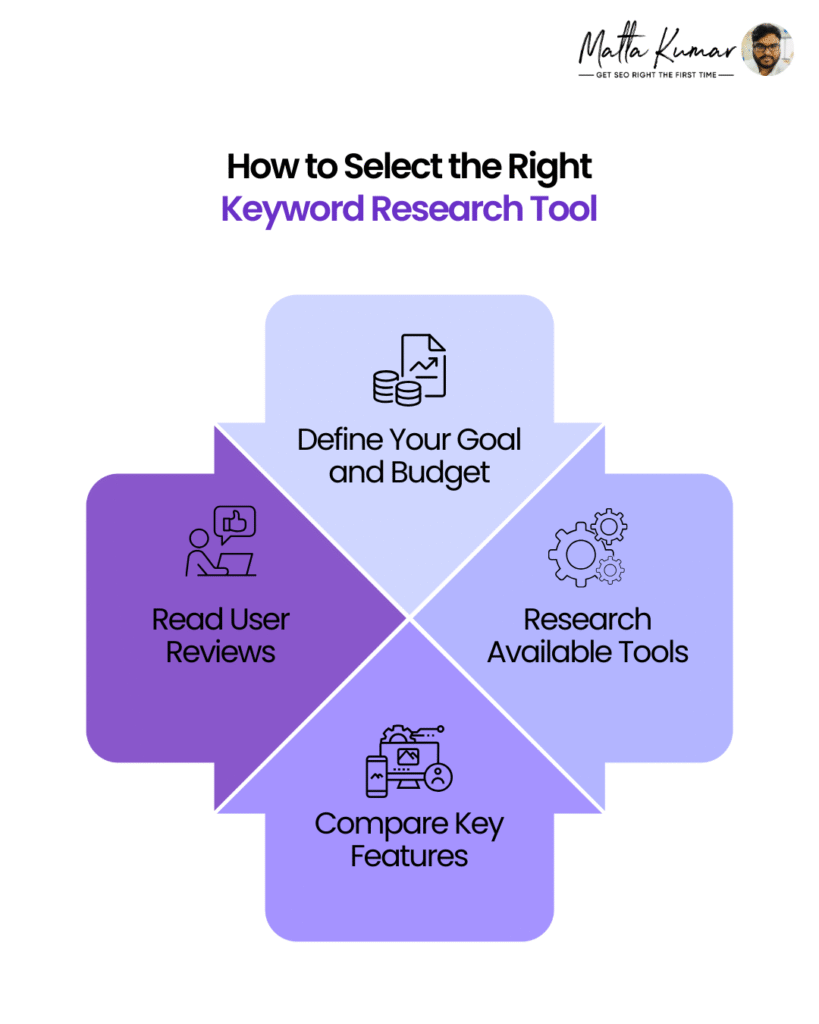
1. Define Your Goal and Budget
Before choosing the best keyword research tool, clarify your SEO goals and the features you genuinely need.
For example, some tools focus on basic keyword suggestions and monthly search volume, while others include advanced competitor keyword analysis, SERP insights, and long-tail keyword discovery.
Also, consider their prices, ranging from a free keyword research tool with limited capabilities to premium platforms offering complete data and AI features.
Key Takeaway: Align your choice with your budget and requirements.
2. Research Available Tools
Start by exploring free keyword research tools like Google Keyword Planner, Google Search Console, or browser extensions such as Keyword Surfer, which are ideal for beginners.
For deeper insights, tools like Semrush, Ahrefs, Moz Keyword Explorer, and SpyFu offer extensive features such as competitor keyword research tool functions and trend tracking.
3. Compare Key Features
Always focus on the tools’ ability to provide diverse keyword suggestions from seed terms, accurate search volume, and keyword difficulty scores. Additionally, make sure that these platforms can perform search intent analysis and competitor keyword gaps.
4. Read User Reviews
Before committing to any SEO keyword search tool, check user feedback on ease of use, interface design, and navigation. Reviews can also reveal whether the tool provides accurate, reliable data, especially when cross-checked against other tools.
Top Challenges for Keyword Research Using Tools (And How to Address Them)
Keyword research tools (AI-powered, paid, or free) are powerful, but they come with a set of challenges. But there are ways for you to overcome the obstacles and get the most out of them.
| Challenge | Solution |
| Limited real-time data in AI keyword research tools | Cross-check with Google Keyword Planner or Google Trends |
| Inaccurate search volume estimates in SEO keyword research tools | Compare results from multiple best keyword search tools |
| No competitor keyword research tool free option | Use paid tools like Semrush or Ahrefs for competitor keyword analysis |
| Missing search intent insights | Pair the SEO keyword planner with AI chatbots for keyword research |
| Difficulty finding niche/long-tail terms | Use a free AI keyword generator or ChatGPT keyword research tool |
- Limited Real-Time Data – Many AI and free keyword research tools can’t provide up-to-the-minute search volume or trend insights. Cross-check results with live data sources like Google Keyword Planner or Google Trends.
- Inaccurate Search Volume Estimates – Even the best keyword search tool may show approximations rather than exact numbers. In that case, multiple research tools should be used to compare data for a more reliable view.
- Lack of Competitor Insights – Some free tools lack a competitor gap analysis feature. So pick the ones that support the same, e.g., Semrush or Ahrefs.
- Overlooking Search Intent—Tools may list high-volume terms without indicating user intent. Pair your SEO keyword planner with AI chatbots to understand and match the context to the intent.
- Difficulty Finding Niche Keywords—Even the best tools can miss long-tail, niche opportunities. Use a free AI keyword generator, like ChatGPT, to expand into conversational and niche terms.
Top SEO Tools for Keyword Research – A Comparative Study
Here is a direct comparison to help you select the best keyword research tool based on your budget.
| Sl. No. | Tool | Features | Price (per month) |
| 1 |  |
Comprehensive keyword research, competitive analysis, backlink audits, and site audit tools integrated with AI insights (Pro–Business tiers). | Starts at $117.33/mo. Multiple plans are available. |
| 2 |  |
Massive backlink index, deep keyword explorer, SERP analysis, and competitive intelligence. | Starts at $129/mo. Multiple plans are available. |
| 3 |  |
Keyword suggestions, SERP rankings, site audits, and on-page optimisation recommendations. | A free trial is available. Paid plan starts at $99/mo. |
| 4 |  |
Competitor PPC & SEO monitoring, historical keyword tracking, and domain overlap insights. | Starts at $39/mo. Multiple plans are available. |
| 5 |  |
Long-tail keyword suggestions, SERP difficulty scoring, and location-based metrics. | Starts at $24.50/mo. Multiple plans are available. |
| 6 |  |
Automated long-tail keyword generation, competitiveness scoring, and rank tracking tools. | Starts at $59.99. Discontinued. |
| 7 |  |
AI-assisted on-page optimisation, content editor with keyword density advice, and real-time SERP comparisons. | Starts at $79/mo. Multiple plans are available. |
| 8 |  |
AI content briefs, question extraction, optimisation suggestions, SERP-based content outlines. | Starts at $45/mo. Multiple plans are available. |
| 9 |  |
AI-driven content planning, topic modelling, content scoring, and gap analysis. | A free trial is available. Pricing on request. |
| 10 |  |
Competitor keyword tracking, PPC analysis, and keyword suggestions. | Starts at $99/mo. |
| 11 |  |
Free keyword suggestions, search volume, competition, and forecast data (via Google Ads interface). | Free |
| 12 |  |
Keyword suggestions, domain overview, content ideas, and backlink tracking. | Starts at $6.67 (also has a free tier). Multiple plans are available. |
| 13 |  |
Visual “question cloud” of queries and prepositions based on real-time search suggestions. | Starts at $5/mo (also has a free tier). Multiple plans are available. |
| 14 | Keyword discovery, search volume, and competitive filtering via a simple interface. | Starts at $17/mo (also has a cheaper tier of $10/mo). Multiple plans are available. | |
| 15 |  |
Keyword ideas across search engines, an autocomplete-based suggestion engine | Starts at $69 (also has a free tier). Multiple plans are available. |
| 16 |  |
(Discontinued) — formerly mapped “People also ask” search clusters | Discontinued. |
| 17 |  |
An AI assistant using language models to generate content, draft SEO topics, or keywords | Free (with a paid tier, ChatGPT Plus, at ~$20). |
| 18 |  |
AI language model for content generation, summarisation, and keyword ideation | Free (with a paid tier, Claude Pro, at ~$20). |
| 19 |  |
Google’s AI assistant for creative content, keyword prompts, and SEO content ideation | Free (with a paid tier, Gemini Advanced). |
| 20 |  |
AI search assistant with instant answers and keyword-based content suggestions | Free (with a paid tier, Perplexity Pro, at ~$20). |
| 21 |  |
AI-powered assistant (e.g., Microsoft) to help generate and optimise content or keyword briefs | Free (with a paid tier, Copilot Pro, at ~$30). |
| 22 |  |
AI-driven keyword discovery and clustering, intent classification (informational, transactional), hub-and-spoke content structuring, content briefing, in-depth cluster analysis, and writing aid. | From US$46/month |
| 23 |  |
Freemium browser extension provides search volume, CPC, competition, and trend data on demand; it includes prompt templates and social media metrics. | Starts from US$2.25 /month (100k credits/year, five seats). Multiple plans are available. |
| 24 |  |
Free tool showing relative search interest over time, regional breakdown, related rising queries, and seasonality patterns. | Free |
| 25 |  |
100% free browser extension offering search volume, CPC, estimated traffic, content suggestions, average word count, SERP competitor metrics directly within Google search results. | Free |
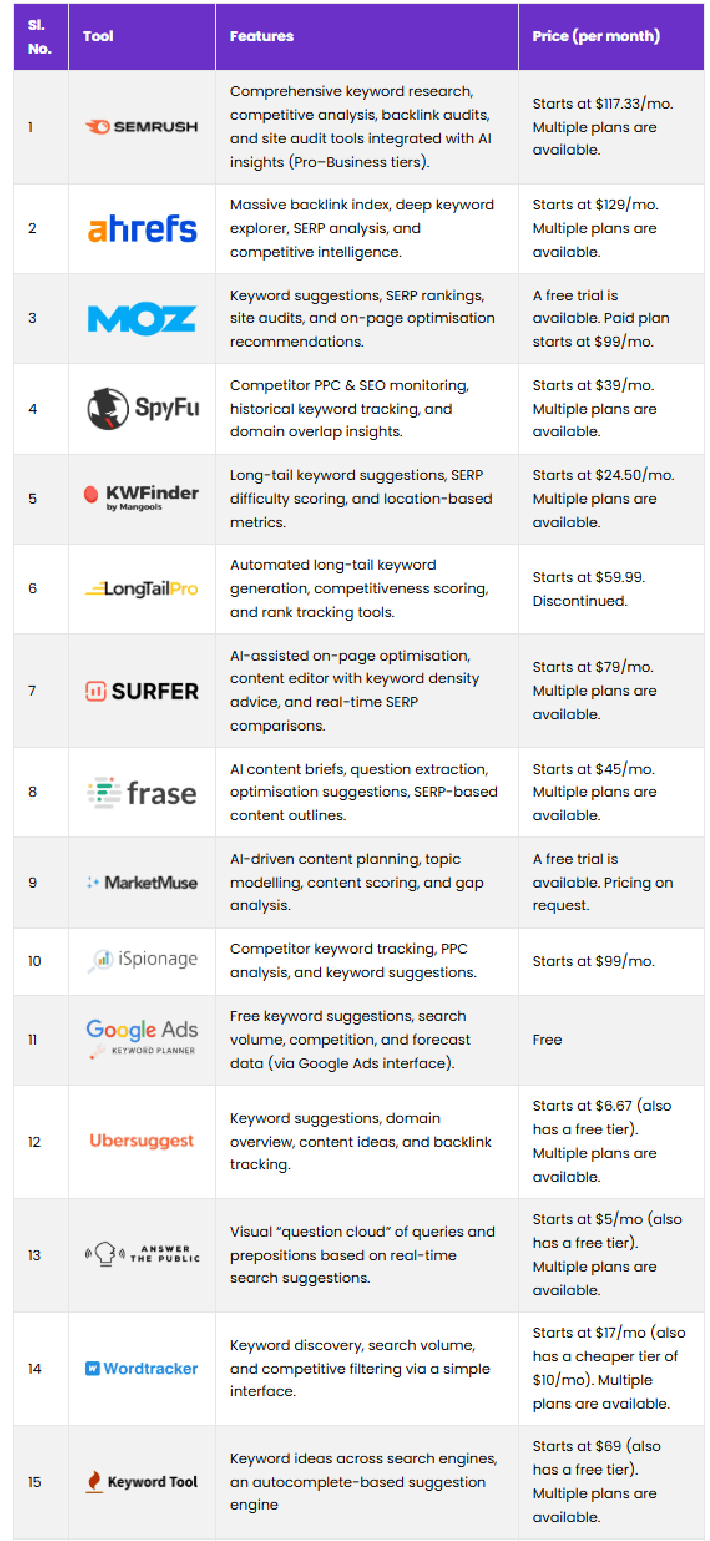
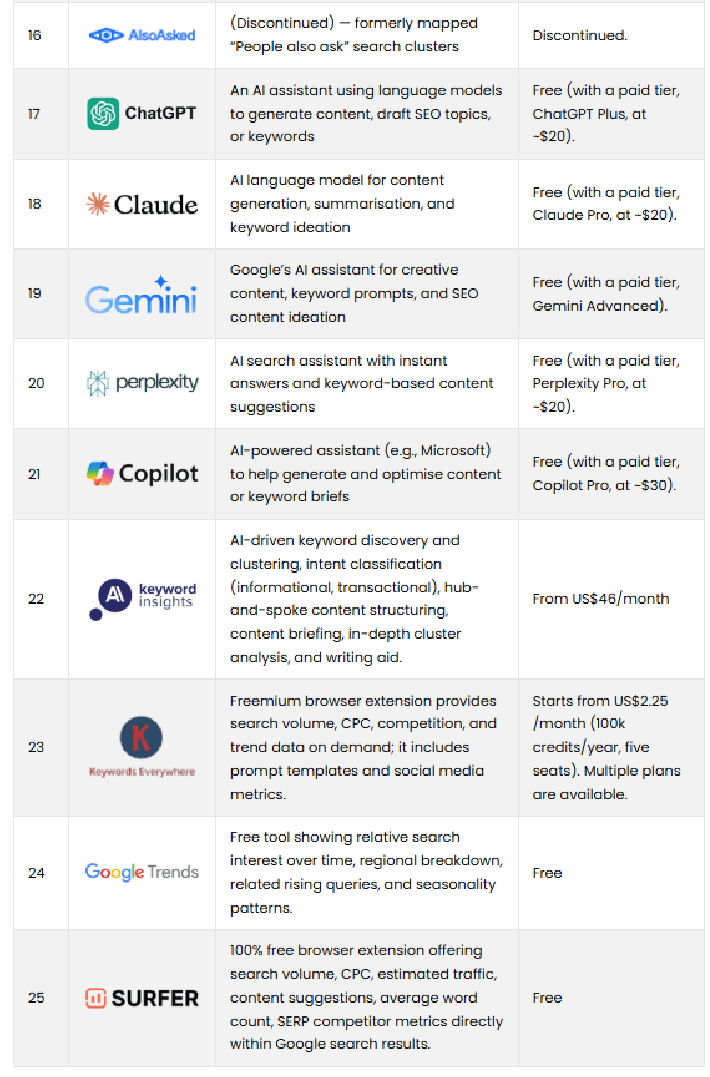
The All-in-One Powerhouses (Best for a Complete SEO Suite)
These all-in-one platforms are the undisputed industry leaders for businesses that require a comprehensive solution. They go beyond simple keyword discovery, offering a complete toolkit for dominating the search landscape.
| Feature | Semrush | Ahrefs |
| Core Strength | An expansive all-in-one marketing toolkit with a particular strength in competitor analysis and PPC data. | A world-class backlink index and site auditing tool, renowned for the depth and accuracy of its data. |
| Keyword Research | Keyword Magic Tool, Keyword Gap, Position Tracking, Organic Traffic Insights. | Keywords Explorer, Content Gap, Site Explorer, Rank Tracker. |
| Competitor Analysis | Extensive domain overview, traffic analytics, advertising research, and social media tracking. | Superior backlink analysis, organic keyword reports, and top pages identification. |
| Pros |
|
|
| Cons |
|
|
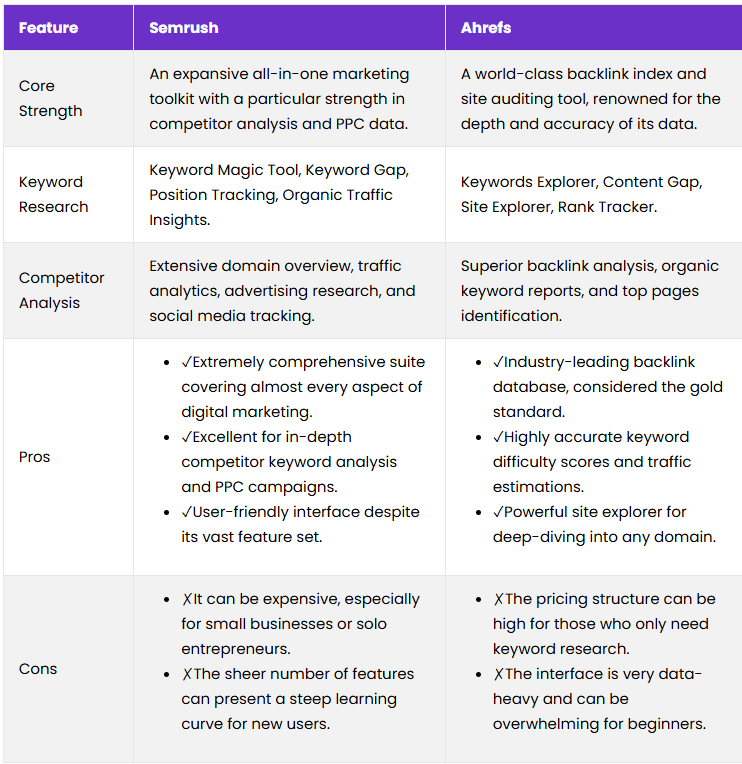
Here’s a brief overview of how to do Keyword research using Semrush vs. Ahrefs
Semrush’s Keyword Magic Tool:
- Navigate to the “Keyword Magic Tool” and enter a broad “seed” keyword related to your industry.
- Use the left-hand filters to narrow your results by search intent, question-based queries, or keyword difficulty.
- Select relevant keywords and add them to the “Keyword Manager” to create a master list for your strategy.
- Export your finalised list to begin creating content or planning your campaigns.
Ahrefs’ Keywords Explorer:
- Enter your primary topic into the “Keywords Explorer” and select your target country.
- Review the keyword ideas report, paying close attention to the Keyword Difficulty (KD) and Traffic Potential (TP) metrics.
- Use the “Matching terms” and “Related terms” reports to discover long-tail variations and semantic keywords.
- Create a new keyword list directly within Ahrefs to save and track your chosen terms.
Top 8 Paid Tools for Keyword Research
These specialised tools offer powerful features at various price points, perfect for those who need focused capabilities without a full suite.
| Sl. No. | Tool | Pros | Cons | Reviews |
| 1 |  |
Very user-friendly with a unique “Keyword Priority” score that simplifies decision-making. | Its backlink and keyword databases are generally smaller than those of Semrush or Ahrefs. | ★ 4.4/5 |
| 2 |  |
Exceptional for historical competitor data, allowing you to see keywords they’ve ranked for over time. | The user interface can feel a bit dated, and it focuses more on competitors than broad discovery. | ★ 4.5/5 |
| 3 |  |
Excellent at finding low-competition, long-tail keywords with a very intuitive interface. | It’s part of a larger suite (Mangools), and the standalone limits can be restrictive for heavy users. | ★ 4.6/5 |
| 4 |  |
Specifically designed to find the best keywords for SEO, focusing on profitability and niche opportunities. | The interface is less modern, and it lacks the broader SEO features of other tools. | ★ 4.25/5 |
| 5 |  |
A top-tier tool for on-page SEO, providing data-driven recommendations based on SERP analysis. | Primarily a content optimisation tool, its keyword discovery features are not as robust as others. | ★ 4.8/5 |
| 6 |  |
Combines keyword research with AI-powered content creation and optimisation briefs. | More focused on the content creation workflow than on deep keyword or competitor analysis. | ★ 4.8/5 |
| 7 |  |
An enterprise-level platform that uses AI to map out entire content strategies and identify topic gaps. | Very expensive and complex, making it unsuitable for small businesses or beginners. | ★ 4.6/5 |
| 8 |  |
Strong focus on competitor PPC and advertising strategies, offering valuable insights for paid campaigns. | Organic keyword features are less developed compared to its PPC analysis tools. | ★ 3.5/5 |
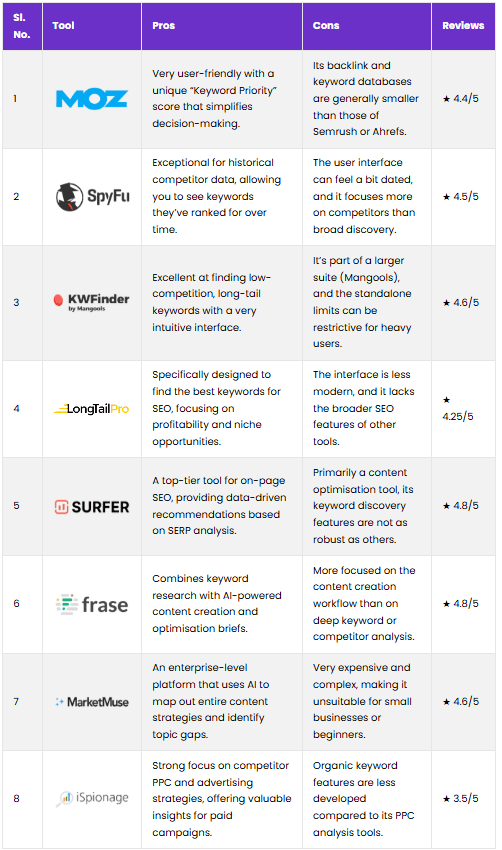
Top 6 Free Tools for Keyword Research
These are the best free keyword research tools for getting started, offering valuable insights without financial commitment.
| Sl.No. | Tool | Pros | Cons | Reviews |
| 1 |  | Directly integrated with Google Ads, providing reliable data from the source itself. | Requires a Google Ads account and often provides broad search volume ranges instead of exact figures. | N/A |
| 2 |  | A generous free tier with a user-friendly interface makes it a great free keyword search tool. | The best features and highest data limits are locked behind a paid subscription. | ★ 4.5/5 |
| 3 |  | Fantastic for visualising user questions and search intent around a topic. | Provides no search volume or difficulty metrics; it’s purely for ideation. | ★ 4.5/5 |
| 4 | A simple and effective tool for finding long-tail keywords, with a decent free version. | Data accuracy and volume may not be on par with the larger, premium providers. | ★ 4.5/5 | |
| 5 |  | Generates many long-tail suggestions from various autocomplete engines (Google, YouTube, etc.). | The free version hides crucial data like search volume, requiring an upgrade to be truly useful. | N/A |
| 6 |  | Maps out “People Also Ask” data visually, which is excellent for understanding user journeys. | The service was discontinued, so it is no longer available. | N/A |
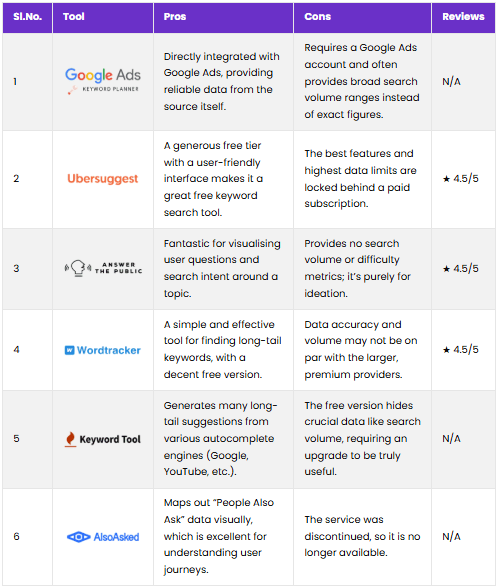
Conclusion
As the guide showed, many SEO tools for keyword research exist, but finding the best one for your business can be challenging. You should know that there’s a solution for every budget, whether it’s an all-in-one platform like Semrush or Ahrefs, or a free specialised tool.
Additionally, AI chatbots are increasingly leveraged to identify user intent and topic clusters. They can be used alongside traditional tools for a complete overview of the best keywords you should target. Combining traditional SEO tools with AI-driven insights will help uncover hidden opportunities and allow you to select the best keywords to boost your website’s performance.
FAQs
- Ahrefs vs Semrush – Which is better for keyword research?
Ans. Both are excellent, but Semrush is often favoured for its comprehensive competitor and PPC analysis, while Ahrefs is renowned for its superior backlink data and keyword difficulty accuracy.
- What is the best keyword research tool for beginners?
Ans. A user-friendly option like Ubersuggest or KWFinder is best-suited for beginners because the interfaces are simple and demonstrate precise, actionable data.
- How do you find low-competition keywords?
Ans. Focus on long-tail keywords (phrases of 4+ words) and use tools like KWFinder or Ahrefs to filter for a low Keyword Difficulty (KD) score.
- What are the best free SEO tools for keyword research?
Ans. The Google Keyword Planner is a reliable starting point, while AnswerThePublic is brilliant for discovering question-based keywords and user intent.
- How do you understand search intent?
Ans. Analyse the top-ranking results for a keyword; the type of content (e.g., blog posts, product pages, videos) will reveal whether users are seeking information, looking to buy, or comparing options.






